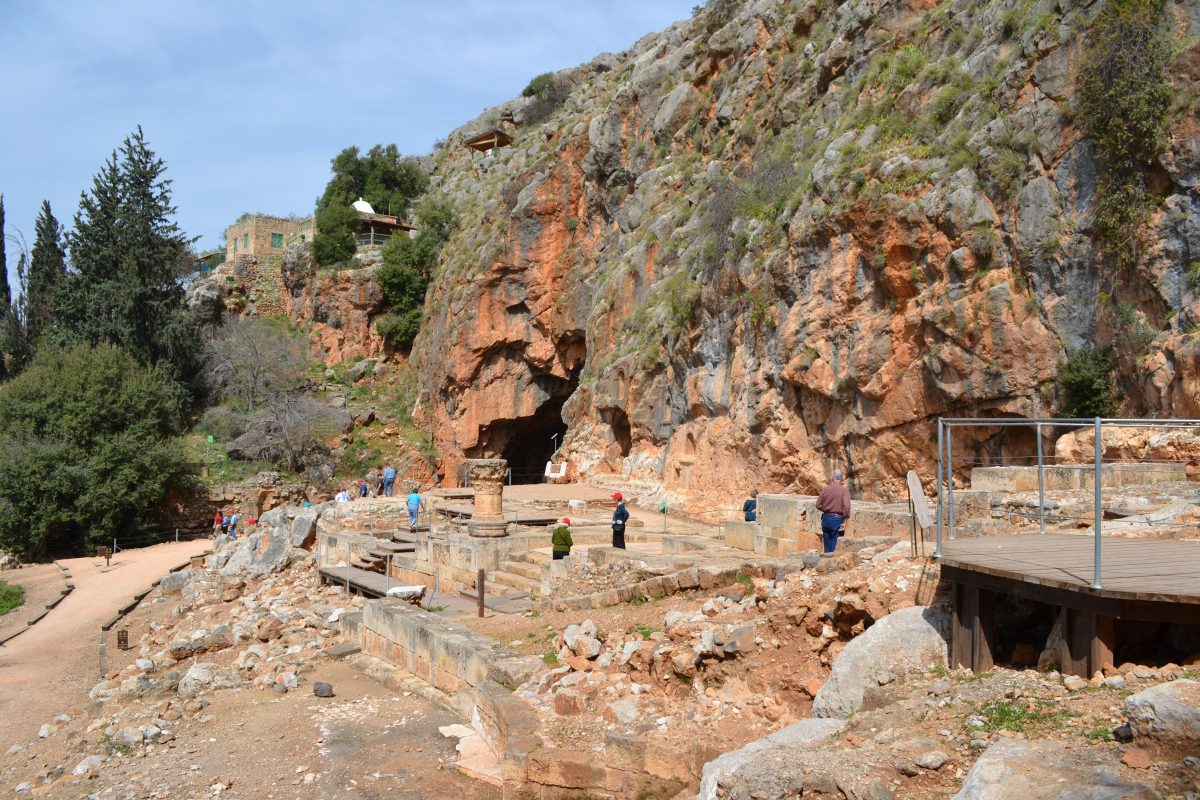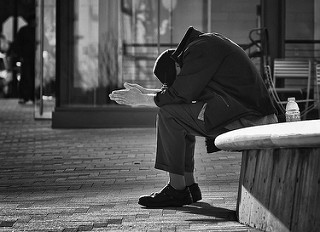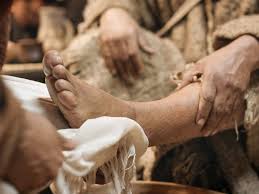Background Passage: Matthew 14:9-23
No physical pain eclipses the pain of losing a close friend or family member. The grief of personal loss hurts. Shatters our sense of normalcy. Threatens our emotional stability. Chokes the very breath from our souls.
Grief might be tempered by the circumstances of our loss. When a loved one has faced months of pain from an insidious disease, for instance, the believer feels a sense of comfort and release knowing that a mother, a sister or friend is no longer suffering. That realization may lessen the gravity weighing on a sad heart, but it does little to fill the emptiness one feels.
Grief is a process as anyone who has lived it knows. Our reactions to it as individual as our own unique personalities.
In their respected book, On Death and Dying, Elizabeth Kubler-Ross and David Kessler plotted five stages of grief that all must travel. People express themselves in various ways, passing through the stages in different ways or times because our relationship to the one who died was unique to us. The authors suggest we must go through each stage if we are to recover from the sorrow that engulfs us with the loss of someone special.
Kubler-Ross and Kessler define the stages of grief: Denial…a time of shock and emotional paralysis where we tend to avoid our new reality; Anger…a time when all the emotions we bottled up for a time get released; Bargaining…when we look for alternatives to fill the void within us; Depression…when reality weighs us down; and acceptance…finding our way forward into a new normal.
I know two families this week going through the death of a family member. Having walked in their shoes in my own family, forever uncertain what to say, I found myself scanning the scripture for words that might grant all of us a foothold of understanding on the slippery slope of sorrow.
Well-meaning folks like me will offer these families platitudes in the coming days based on our personal experiences. The intent will be appreciated. The care and concern evident. But the words will most likely fall on a heart too troubled to hear.
Many passages of scripture tells us about God’s comfort during times of despair. There is beauty and value in those verses. As we seek to live in the image of God and if Jesus represents the image of God on earth, then what did Jesus know of our sorrow?
I suspect there were a thousand of unrecorded occasions when Jesus put his arm around a crying widow, offered a prayer for a brother in mourning, took a meal to a neighbor who lost a sister, prayed for a family whose mother died peacefully in her sleep, or stood quietly beside a parent whose child was ravaged by disease when no word would bring comfort. Scripture also tells us Jesus felt the grief resulting from the death of someone for whom he cared deeply.
His experiences with grief were personal, not second hand, full of the emotional trauma death brings. Late in his earthly ministry, his good friend Lazarus died. Though Jesus knew the outcome of this experience would be new life, scripture tells us he wept. His anguish over the loss of someone he loved so real and heart-wrenching.
Yet, another profound encounter with death touched Jesus at the beginning of his ministry. Not too long after Jesus gathered his disciples together and taught them things they needed to know about the kingdom of God, he sent them out, two-by-two, on a mission trip to preach the good news of God’s coming salvation.
At the same time, Herod, the Judean tetrarch, arrested John the Baptist, Jesus’ cousin and early partner in ministry. The Baptist ran afoul of the regional governor when he challenged Herod’s divorce and marriage to his sister-in-law. While John was in prison, Herod, intrigued by his step-daughter, promised her anything she wished. After talking to her conniving mother, the step-daughter asked for John the Baptist’s head on a platter. Herod did not disappoint and ordered John beheaded.
News of this horrific death reached Jesus just as the disciples were returning from their trip. The news was unsettling. Jesus and John, connected by circumstance of birth and passion of ministry, held deep respect for each other.
Jesus once told the crowds who followed him that “among those born of women there is none greater than John,” revealing his level of affection and respect for the tough-minded preacher. Jesus’ love was returned many times over. John stood waist deep in the Jordan when Jesus presented himself to be baptized at the starting point of his earthly ministry. Knowing who he was and the nature of his work, John hesitated. “I’m not worthy to tie your sandals,” he said.
When Jesus heard the news about his cousin, Matthew 14 tells us , “he withdrew by boat privately to a solitary place.” Saddened. Distraught. Struggling with both the loss and the method of his death. Seeing in John’s death, perhaps, a reflection of his own future.
As he so often did when troubled with life, Jesus needed to feel the presence of his heavenly father. In the middle of the excitement of the missionary reports, he moved away from the crowd to find a quiet place to be alone in his thoughts, to deal with his emotions and his grief.
Yet, the crowd would not let him go. Maybe they were unaware of John’s death. Maybe they didn’t understand the connection between the men as cousins. Maybe they were so caught up in their own struggles they couldn’t see into the hurting heart of another person. Whatever possessed them to come, a large crowd circled around the Sea of Galilee to wait as Jesus’ boat came ashore.
Many of us can empathize with Jesus. He needs his time alone…his space to deal with his own breaking heart. Life will not allow it. Jesus had a choice, to look inward or outward. We face the same choice in times like this. We can turn inside ourselves, skirt the crowd and run into the desert alone. Or we can look outside ourselves to the people pressing around us and extend God’s mercy to them.
Matthew tells us Jesus saw the crowd and had “compassion on them.” What an amazing picture this presents! A grieving Christ sees the gathering crowd. When most of us would turned the boat around, Jesus dried his tear-stained cheeks with the sleeve of his cloak, said a new prayer for emotional strength, took in a deep breath and went about his work healing the sick, comforting the sorrowful and feeding the famished.
He spent the rest of the day with them, eventually feeding them with a little bread and fish before sending them on their way. A picture settles in my thoughts. The last family finally turned to leave. Jesus, who set aside his own sorrow for that time, waited until they were out of sight before sagging heavily on a boulder, allowing the emotion pent inside to flow freely.
Scripture says at some point he gathered himself, climbed the wilderness mountain as he had intended to do earlier that day and sought refuge in a father who understood clearly the heaviness of his heart.
So, what does this tell me about grief? My faith pales in comparison to the faith of Jesus. How hard it is to carry on when all we want to be is carried away. This biblical episode in the life of Jesus tells us life never stops for the grieving. Never slows down. Never considers our emotional state. Life goes on.
The daze of days surrounding the loss of a loved one blow by with little regard to what we want or need. In the days that follow death there will be bills to pay. Places to go where no one knows our anguish. Children tugging at our sleeve who need us to be in the moment with them. Co-workers expecting us to be on our game. Work still to be done. Our ability to find the peace we need, the solitude we crave, gets overshadowed by the press of the crowd around us.
We can push the crowd away or do as Jesus did when he pulled the boat to shore…embrace for a moment the opportunity God puts in front of us to serve him. To testify through our last reserve of faith and strength to the power of the father who gives us the ability to put one foot in front of the other and move when all we want to do is turn the boat around.
I don’t want to minimize the difficulty of walking our grief walk. It is healthy to grieve. Healthy to find time alone to consider the meaning of this personal loss. Healthy to weep.
As Jesus sailed the boat across the Sea of Galilee that day, I suspect the horizon lay unseen in the distance obscured by the tears in his eyes. His vision limited to the prow of the boat as he stared blankly into a tomorrow without his dear friend. That’s the way I feel on days like that.
However deeply Jesus mourned John’s death, he didn’t stay in the boat. He turned grief into the fuel that fired his own sense of mercy and ministry. You see, all the hurt and pain we experience at the death of one we love can empower us to love more deeply, embrace more often and to serve more willingly.
These two friends of mine who mourn this week the loss of a brother and sister, respectively, will be in Collique, Peru, next week on a mission trip. They join others in building small homes for families who possess next to nothing. Despite their personal sorrow, they will step out of their boats on the shore of a dusty hill in South America to share the compassion of Christ to strangers unaware of the grief they bear. What a testimony!
In our most desperate times, our dependence on Jesus Christ serves as dynamic evidence of the power of God’s sustaining love to a lost world with little on which to cling in life’s toughest times.
Grieve because you must. Mourn for lost love ones. Cherish the memories of love that runs deeply. But, along the way, may our emotions turn ever outward to spirit-inspired, Gospel-driven, compassion.








